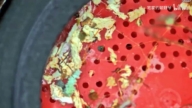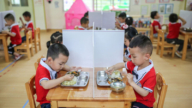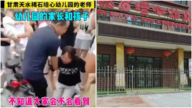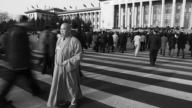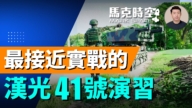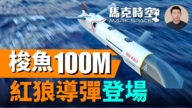【新唐人2012年10月20日讯】大陆环境保护部在一份报告中承认,中国核安全问题“情况不容乐观”。但从9月开始,环保部密集通告多个省市,批准了各项核电项目。业内人士认为,这是中共当局重新启动核电项目的迹象。令专家们对此感到忧虑。
9月份起,环境保护部批准延续北京、上海、江苏、大连等多地,民用核安全设备制造许可证﹔和批准民用核安全设备焊工焊接操作工资格﹔另外,这个月10号,还核可了116家聘用单位的778名通过“民用核安全设备无损检验考试人员”的资格。而,10月25-26号,第二届“在建核电厂经验回馈交流会”,将在杭州召开。业内人士认为,这些都是核电项目“重启”的一个明显信号。
大陆媒体报导,环保部16号披露,根据中央《十二五核安全规划》,在2015年前,将投资近800亿人民币来加强核设施安全。
“中国核安全信息交流中心”发起人何岸泉分析,重启核电项目的原因,一是因为《十二五规划》是胡温执政期制订的目标,为完成政绩而继续按计划发展。另外,也是中共当局挽救中国面临经济危机的一项措施﹔拉动以核电为龙头的相关企业,保持中国经济成长。
“中国核安全信息交流中心”发起人何岸泉:“第三点,大家都知道中国现在很多人认为是权贵资本主义,很多央企和国企,在有权有势的家族的垄断和操控下,为了获得经济利益,他们要开展很多项目,那么核电就是他们夺取利益的手段之一。”
何岸泉指出,2010年,中央委员、“中国核电集团”党组书记康日新,由于贪污了7千万欧元被“双开”。
何岸泉:“为什么要提这件事情就是说明,在中共一党专政的体制下,包括核电部门这些官员,他们不例外的保持了中共官员的贪污、腐化、渎职、越权这个特色,在贪官的情况下他能够为核电事业做出什么贡献呢?”
日本“福岛核事故”发生之后,中共国务院在去年(2011年)3月,出台核电“国四条”,要求进行全面安全大检查。
另一方面,今年6月,有关“核安全与放射性污染防治”的报告中提出,核安全与放射性污染防治面临挑战。
报告中说,中国核电具多种反应堆型、多种技术、多类标准并存的局面,给安全管理带来一定难度﹔而运行和在建核电厂预防和缓解严重事故的能力仍需进一步提高﹔并且,科技研发需要加强﹔应急体系需要完善﹔监管能力需要提升。
何岸泉:“各种设计的都有,就造成一个隐患就是,无法在管理上面、在经验上面,得积累足够的经验,来保证核建反应堆的这个现场的运行,我们知道成熟的一个安全的投资项目,它必须在同一个项目上面积累经验,不同的设计,互相之间的经验,它无法共享。”
何岸泉认为,这将造成资金、管理、研究人员实力的分散,也导致核能安全的隐患。
何岸泉:“管理人才跟不上。在管理、操控核电站运行的过程当中,一定会发生非专业人员,在专业的岗位上面进行工作,或者专业人员培训不够,又是一个很大的隐患。核电站庞大的专业人员,必须具有非常高的专业素质﹔中国不具备这个条件,这样搞核电大跃进,当然会造成非常大、非常大的隐患。”
目前,欧美国家已经开发新的替代能源。何岸泉指出,中共当局如果仍然一意孤行,不能及时的向先进国家学习,墨守成规,最终倒楣的必然是整个大陆百姓。
采访编辑/梁欣 后制/钟元
The CCP invests 80 billion Yuan in nuclear safety but the situation is still “challenging”
Previously, China’s Ministry of Environmental Protection (SEPA)
acknowledged in a report that the overall situation of China’s nuclear safety is challenging.
However, since September, SEPA has intensively issued
approvals of nuclear plant projects in many cities all over China.
As believed by professionals, this suggests that the CCP authority
will restart its nuclear programs, which causes experts concern.
After September, SEPA extended permits of nuclear safety
equipment production for civil use in cities of Beijing, Shanghai, Dalian, and Jiangsu province, among others.
SEPA also approved welder permits of nuclear safety
equipment for civil use.
Furthermore, on October 10th, SEPA certifies 778
non-destructive testing technicians for 116 employing unites.
On October 25th, the Second Experience Sharing Seminar
of Nuclear Power Plants on Construction will be held in Hangzhou.
Professionals believe that these are clear signals that
nuclear plant projects by the CCP authority are beginning again.
According to some Chinese media, SEPA revealed
on October 16th that the 12th Five-year Plan of nuclear safety
requires that 80 billion Yuan will be spent improving
safety protection of nuclear equipment before 2015.
Founder of Information Center for China’s Nuclear Safety,
He Anquan, remarked that since the 12th Five-year Plan
was worked out during Hu Jintao and Wen Jiabao’s era,
the restart of nuclear programs is to make some achievements following the original, pre Hu, plan.
He also said this is a move against China’s economic
crisis by the CCP and they attempt to sustain China’s
economic development by motivating enterprises related
to the nuclear power industry.
He Anquan, Founder of Information Center for China’s
Nuclear Safety: ”In addition, we all know that many Chinese define China’s economy as “Crony Capitalism.”
Most state-owned companies are under the control
of influential clans of the CCP leaders.
To make more profits, they need many new projects.
Nuclear power plant projects serve this goal as well.”
As an example, He Anquan mentioned former CCP Central
Committee member, Party Secretary of China National Nuclear Corporation, Kang Rixin.
He was expelled from the CCP and removed from his position
in 2012 because he embezzled over 70 million Euros.
He Anquan: ”The story of Kang Rixin tells us that, under
the CCP’s one-party dictatorship,
officials in the nuclear power industry are inevitably guilty of corruption,
dereliction of duty and power abuse like other CCP officials.
Under such a situation how can you expect them
to make contributions to the whole industry?”
After Japan’s Fukushima nuclear accident, the CCP State
Council announced “four principles” in March 2011,
which requires the entire nuclear power industry
to make thorough safety inspections.
In June, 2012, an official report of SEPA pointed out that
the problem of nuclear safety and preventive treatment of radioactive pollution is still challenging.
The report stated difficulty of safety management lies
in the fact that there exist various types of nuclear reactors,
nuclear power techniques, as well as operation standards,
and that the capability of preventing or handling serious accidents is still inadequate.
Furthermore, the research and development capability,
emergency response system, and regulatory system all need to be improved.
He Anquan: ”Various designs of nuclear plants
bring up a problem.
It is important to accumulate enough experience
to operate a nuclear plant safely.
We all know that a safe and mature project results from
a lot of experience from repeat practice.
However, the experience from different nuclear plant
projects cannot be shared.”
He Anquan believes that different project designs scatter
the capital, management and research, which is the hidden danger in nuclear safety.
He Anquan: ”One problem is the shortage
of professional workers.
So in managing and operating a nuclear plant, there must be
cases where nonprofessional or under-trained employees
have to work at a professional capacity.
This is a huge hidden danger.
You have to have a large staff with high professional
standards run those the nuclear plants.
Currently this condition is not fulfilled in China.
Such a ‘Great Leap Forward’ in nuclear plant construction
will definitely bring very, very dangerous safety problems into the mix.”
So far the western countries have been developing new
resources to replace nuclear plants.
He Anquan warned that if the CCP authority doesn’t learn
a lesson from developed countries and
stick to its original plan regarding nuclear plants,
all Chinese people will inevitably pay for this mistake.



